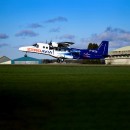It’s been a long journey, but commercial aviation is finally getting closer to switching to aircraft with clean propulsion. Hybrid aircraft, battery-electric, or hydrogen-electric aircraft are gearing up to replace old-generation models that run on conventional fuel. In Europe, ZeroAvia is one of the most important players in green aviation.
Almost two years ago, ZeroAvia was making headlines with an interesting test. The ZA-600, its 600 kW powertrain for hydrogen-electric aircraft, successfully pulled a 15-ton heavy-duty truck. The company started out with a smaller 250 kW version that could power a six-seat aircraft, and gradually worked its way up to the ZA-600 for a 10-to-20-seat airliner. The final goal is a 2MW+ powertrain, the ZA-2000, which will be able to propel large airliners of up to 80 seats.
After years of development and tests, the UK-headquartered company finally carried out a test flight in January, using an existing aircraft that was converted to hydrogen-electric propulsion. It was a twin-engine, 19-seat Dornier 228, which was retrofitted with a full-size ZA-600 powertrain. The Dornier took off from the Cotswold Airport and completed a ten-minute flight in the area.
The next step is to join forces with various airports, in order to start building and testing the adequate infrastructure for future hydrogen-powered flights.
Earlier this month, ZeroAvia teamed up with Rotterdam The Hague Airport, Netherland’s second-city airport, in preparation for upcoming demonstration flights in 2024. At first, they are aiming for short-distance flights in the region, 250 miles (402 km) at most. But the plan is to eventually launch regular passenger flights powered by hydrogen, starting 2025. Shell is also part of that project, as the hydrogen supplier.
The next airport to team up with ZeroAvia is Birmingham. It seems that one of the airport’s terminal building that’s no longer in use could become a platform for future hydrogen flights. More specifically, an area near this Elmdon building will be used to set up hydrogen refueling infrastructure. Then, flight tests and other operations will be organized at this base.
In just two years, a 20-seat aircraft powered by ZeroAvia’s powertrain, could be carrying passengers across 300 nautical miles (550 km). In other words, routes such as Birmingham-Dublin or Birmingham-Glasgow could become compatible with flights that are 100% emission-free.
Even the idea of green flights to Mediterranean vacation spots is not that far-fetched. Before the decade ends, large airliners could be flying up to 80 passengers in total comfort, with no emissions, from the UK to these vacation destinations. At least, that’s what ZeroAvia hopes to achieve. Right now, it’s still hard to tell which European airport will be the first to officially kick off hydrogen-powered passenger flights. But one thing seems certain: the ZA-600 will write aviation history.
After years of development and tests, the UK-headquartered company finally carried out a test flight in January, using an existing aircraft that was converted to hydrogen-electric propulsion. It was a twin-engine, 19-seat Dornier 228, which was retrofitted with a full-size ZA-600 powertrain. The Dornier took off from the Cotswold Airport and completed a ten-minute flight in the area.
The next step is to join forces with various airports, in order to start building and testing the adequate infrastructure for future hydrogen-powered flights.
Earlier this month, ZeroAvia teamed up with Rotterdam The Hague Airport, Netherland’s second-city airport, in preparation for upcoming demonstration flights in 2024. At first, they are aiming for short-distance flights in the region, 250 miles (402 km) at most. But the plan is to eventually launch regular passenger flights powered by hydrogen, starting 2025. Shell is also part of that project, as the hydrogen supplier.
The next airport to team up with ZeroAvia is Birmingham. It seems that one of the airport’s terminal building that’s no longer in use could become a platform for future hydrogen flights. More specifically, an area near this Elmdon building will be used to set up hydrogen refueling infrastructure. Then, flight tests and other operations will be organized at this base.
In just two years, a 20-seat aircraft powered by ZeroAvia’s powertrain, could be carrying passengers across 300 nautical miles (550 km). In other words, routes such as Birmingham-Dublin or Birmingham-Glasgow could become compatible with flights that are 100% emission-free.
Even the idea of green flights to Mediterranean vacation spots is not that far-fetched. Before the decade ends, large airliners could be flying up to 80 passengers in total comfort, with no emissions, from the UK to these vacation destinations. At least, that’s what ZeroAvia hopes to achieve. Right now, it’s still hard to tell which European airport will be the first to officially kick off hydrogen-powered passenger flights. But one thing seems certain: the ZA-600 will write aviation history.







